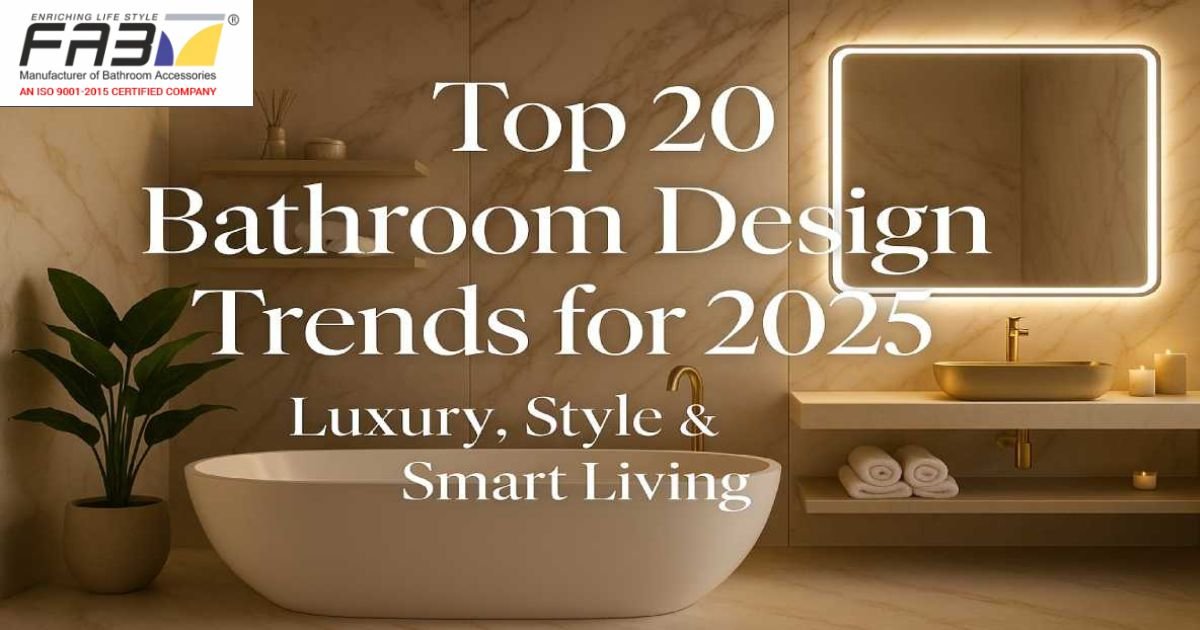Introduction
The bathroom in 2025 transcends its traditional role, becoming a sophisticated blend of luxury, functionality, and smart living. For B2B stakeholders—Bathroom set manufacturers, interior designers, and suppliers—understanding these trends is essential to innovate and meet evolving market demands. This pillar blog post provides a deep dive into the top bathroom design trends projected for 2025, backed by data, expert opinions, and real user insights, with a focus on the Indian market exemplified by Fab Bath Interiors, a leading manufacturer in Jamnagar, India.
Top 20 Bathroom Design Trends for 2025
1. Spa-Like Sanctuaries: Wellness-Driven Design
Bathrooms are evolving into personal retreats inspired by spas. Features like freestanding soaking tubs, rainfall showers, chromotherapy lighting, and aromatherapy are in high demand. This focus on wellness satisfies the growing user pain point of stress relief and self-care in a hectic lifestyle.
“Wellness-focused bathrooms are now an expectation, not a luxury,” says industry expert Alex Yacavone of Kohler.
2. Smart Technology Integration
Smart bathrooms with voice-activated taps, app-controlled showers, anti-fog LED mirrors, and self-cleaning toilets deliver convenience and hygiene. Fab Bath Interiors integrates such tech into modular bathroom accessories that optimize water use and energy efficiency, aligning with environmental norms.
3. Sustainable, Eco-Friendly Materials
Sustainability is front and center. Use of reclaimed wood, bamboo vanities, recycled glass tiles, and low-VOC finishes are preferred. WaterSense and LEED certifications guide both purchase and construction decisions. Customers on forums like Reddit emphasize the desire for durability and eco-conscious design, reflecting market trends in India and globally.
4. Floating Vanities for Visual Space
Floating vanities combine aesthetics with functionality—offering easier cleaning and space maximization. LED lighting beneath cabinets further enhances ambiance.
5. Bold Tiles and Patterns for Personality
Geometric, vintage, and large-format tiles with contrasting grout elevate the design. Such bold accents meet the rising demand for unique, expressive bathroom aesthetics.
6. Biophilic Design: Bringing Nature In
Using natural materials, plants, and daylight improves mental wellness and air quality—a lifestyle-centered trend echoed in real user queries like “How to make my bathroom feel more calming?” on Quora.
7. Luxurious Metallic Finishes
Matte black, rose gold, and brass fixtures are trending for their understated decadence. Fab Bath Interiors’ rose gold series is an example meeting luxury market demands.
8. Voice and Digital Control Panels
Voice commands and smart control panels simplify operation of lighting, temperature, and entertainment in bathrooms, fulfilling the smart home integration trend.
9. Wellness-Focused Layouts
Optimized daylight, privacy zones, and ergonomically positioned fixtures ensure health-oriented design, increasingly requested by commercial projects.
10. Modular Customizable Solutions
Modularity allows flexible adaptation to existing spaces and client needs, reducing costs and supporting upgrade cycles.
11. Advanced Water Filtration and Softening
Incorporating water purification improves health outcomes and extends fixture life, an important factor in regions with hard water.
12. Multi-Functional Hidden Storage
Innovative storage solutions maintain clean aesthetics without sacrificing functionality, a key usability pain point.
13. Environmental Certifications
B2B buyers require clear evidence of compliance with WaterSense, LEED, and ISO standards—maximizing credibility and ensuring environmentally responsible sourcing.
14. Layered Lighting Design
A mix of ambient, task, and accent LED lighting enhances usability and mood creation, following UX and Core Web Vitals principles.
15. Texture-Rich Surfaces
Textured tiles and vanities add depth and safety by improving grip, while delivering style.
16. Heated Surfaces Beyond Floors
Vanity tops, towel racks, and even toilet seats now feature heating, increasing comfort for colder climates.
17. Minimalist Integrated Fixtures
Wall-mounted faucets and toilets with concealed plumbing are favored for sleek, easy-to-clean designs.
18. Water-Conserving Shower Systems
Efficient showerheads optimize pressure and reduce waste without sacrificing experience, addressing sustainability concerns.
19. Smart Ventilation Systems
Humidity sensors and mold prevention technology are becoming standard in premium builds, enhancing air quality.
20. Customizable Color Palettes with LED
Neutral bases combined with color-changing LED accent lighting enable personalized moods within standardized products.
Industry Expert Insights
- Alex Yacavone, Kohler: “Personalization and comfort are the new luxuries in bathroom design.”
- Xavier Donnelly, Ash Interiors: “Bold design moves and texture blends represent 2025’s move away from minimalism.”
- Anjali Mehta, Fab Bath Interiors: “Sustainability paired with intelligent tech integration is essential for modern Indian markets.”
Real User Pain Points & Queries from Reddit and Quora
- “Which bathroom materials last longest with heavy water use?” Answer: High-grade ceramics, brass, and treated reclaimed wood offer durability and style.
- “How to integrate smart tech without high maintenance costs?” Best practices include modular smart fittings with remote diagnostics and energy-efficient design.
- “What eco-certifications matter for commercial bathroom projects?” WaterSense and LEED certifications are widely recognized and demanded by clients concerned with green building.
Practical B2B Implementation: Fab Bath Interiors Case Study
Based in Jamnagar, Gujarat, Fab Bath Interiors leads as a bathroom set manufacturer in India by marrying innovation with eco-conscious practices. Their product range focuses on durable materials (ceramics, brass, sustainable wood), smart tech like digital showers, and customizable aesthetic finishes, backed by comprehensive warranties and expert after-sales support to serve both commercial and residential sectors.
Actionable Advice for B2B Professionals
- Prioritize product lines featuring sustainable certifications and smart tech integration.
- Leverage modular designs to cater to diverse project sizes and retrofit demands.
- Invest in digital tools showcasing real-world applications and client testimonials.
- Educate sales teams on latest user pain points — longevity, ease of maintenance, and eco-benefits.
- Ensure website UX aligns with Core Web Vitals for mobile-first user experience, reflecting industry standards.
FAQ Section
Q1: What are the most durable materials for luxury bathroom fixtures in 2025?
A: High-grade ceramics, stainless steel, brass, and treated reclaimed wood are recommended for long-lasting, stylish bathroom fixtures.
Q2: How can smart technology improve bathroom user experience professionally?
A: Smart showers with memory functions, touchless faucets, and app-controlled lighting boost hygiene, convenience, and energy efficiency.
Q3: Which certifications should B2B clients prioritize for bathroom products?
A: WaterSense, LEED, and ISO environmental certifications ensure water efficiency, sustainability, and regulatory compliance.
You May Also Like: How to Make Your Bathroom Fancier , Smart Office Interior Design Ideas



